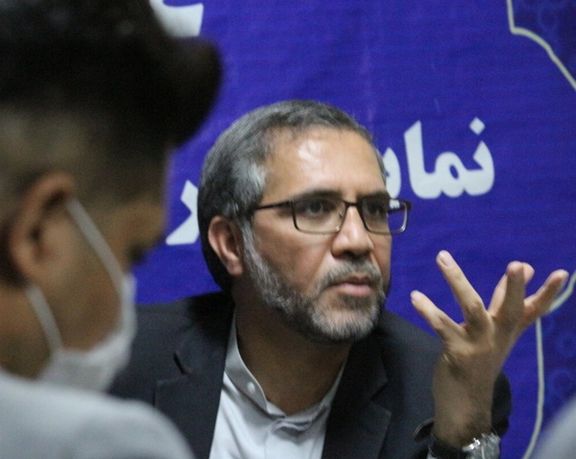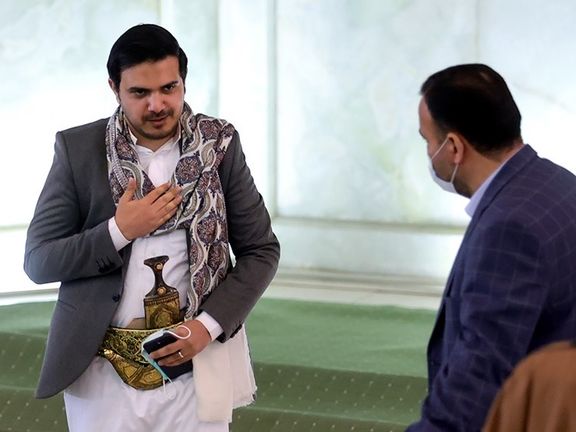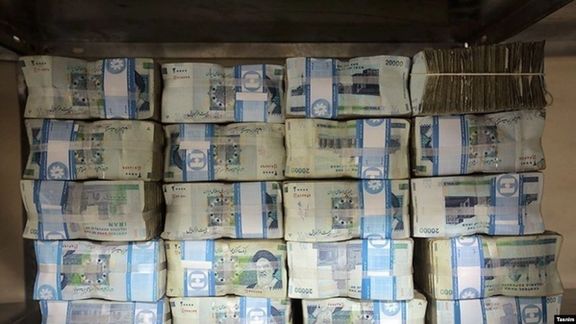Iran Lawmaker Says 25-Year Deal With China 'Not A Binding Agreement'

An Iranian lawmaker said Friday that the long-term agreement signed with China does not need ratification by parliament because it is not “a binding” contract.

An Iranian lawmaker said Friday that the long-term agreement signed with China does not need ratification by parliament because it is not “a binding” contract.
Abbas Golru, member of parliament’s national security and foreign policy committee told Tasnim news agency in Tehran that the 25-year agreement with China is a document of understanding and “a framework for cooperation.” He added that so far, no binding treaty or agreement has been signed between the two countries.
In recent months, the Islamic Republic has touted the agreement with China as a major political and economic breakthrough that would provide a lifeline for its broken economy amid United States' sanctions. In mid-January, foreign minister Hossein Abdollahian visited Beijing and discussed expanding relations. Tehran claimed that the 25-year agreement was “activated” during the trip.
Iranian politicians who are currently out of power, as well as pundits and thousands of Iranians on social media have criticized the regime’s quest to attach itself to China and Russia. Tehran is also trying to sign a 20-year deal with Russia, but so far, Moscow appears not to be interested. Many have also questioned the fact that the contents of the agreement have been kept secret.
Golru also maintained that for the deal with China to become binding specific agreements must be signed in various fields and ratified by the parliaments of both countries.

Human Rights Watch says Iran is committed to crush any grassroots effort to protect human rights and urged world powers to press Tehran to stop the crackdown.
The rights group said on Friday that the recent heavy sentence meted out against prominent political prisoner Narges Mohammadi shows that Iran’s revolutionary courts are criminalizing human rights activism.
In a five-minute trial on January 15, Branch 26 of Tehran’s revolutionary court sentenced rights defender Mohammadi to eight years in jail and 70 lashes on charges not announced or explained by authorities.
According to her husband, Taghi Rahmani, the summary trial was held behind closed doors and that she was denied access to a lawyer.
“Iranian authorities’ cruel detention and prosecution of Narges Mohmmadi only one year after she was released from an earlier prison term and then piling on more unfair prison sentences are clearly intended to crush her into silence at all costs,” said Tara Sepehri-Far, senior Iran researcher at Human Rights Watch.
She also called on authorities to free the rights activist, saying, “The authorities should immediately and unconditionally release Narges Mohammadi, who has already unjustly been imprisoned for years.”
“People like Narges Mohammadi are the ones who work to bring Iranian civil society together,” Sepehri-Far stressed, noting that “Governments that are engaging diplomatically with Iran should make sure to press the government to stop its relentless crackdown against human rights defenders.”
In a letter from the notorious Gharchak (Qarchak) Prison, obtained by Iran International, Mohammadi said the court stated her nomination for the Nobel Peace Prize as evidence of her criminality.
"What reveals the hostility and baselessness of the charges [brought against me] and the legal procedure leading to the ruling is that I have been found guilty for being nominated by the Norwegian Amnesty for the Nobel Peace Prize," Mohammadi, a lawyer by profession, wrote from prison.
In March 2021, the chairman of Amnesty International in Norway announced that two members of the Norwegian parliament had nominated the Iranian human rights activist for the Nobel Peace Prize, backed by the local Amnesty branch.
Moreover, in a joint statement by German Federal Government Commissioner for Human Rights Luise Amtsberg and French Ambassador for Human Rights Delphine Borione on Thursday, denounced Mohammadi’s conviction as unjust and expressed extreme concern that her detention in Gharchak Prison may further worsen her health, referring to her serious neurological disease that causes muscular paralysis.
“It was with dismay that we learned that Narges Mohammadi has been sentenced to eight years in prison and 70 lashes. Narges Mohammadi’s peaceful campaign for women’s rights and the improvement of the human rights situation in Iran, in particular for the abolition of the death penalty, is not a criminal offence,” read the statement.
“We call on Iran’s political leaders to comply with the country’s obligations under international law and to release Narges Mohammadi immediately”, they said.
Mohammadi was arrested in mid-November at the death anniversary of a citizen, Ebrahim Ketabdar, who was shot dead by security forces during the November 2019 protests.
She is the vice-president of the Defenders of Human Rights Association, the Chair of the executive board of the Peace Council of Iran, and a member of "Step-by-Step Abolition of Execution" campaign.
Mohammadi has been to jail several times over the past two decades. She was freed from Evin Prison in September 2020 after serving more than five years when she had no contact with her husband and children for long periods of time.
Iran executed 299 individuals in 2021, including four juvenile offenders -- a 26-percent increase compared with 2020. Courts issued 85 death sentences until December 20.
Persecution of human rights and political activists and execution have increased since hardliner president Ebrahim Raisi took office last August.

In a state-sponsored move in a few large Iranian cities, Friday Prayer attendees held demonstrations against the war in Yemen and Saudi Arabia’s involvement.
The Friday Prayer sermons were focused on Yemen on January 28, with clerics representing the Supreme Leader Ali Kamenei calling for an end to the Saudi attacks on Houthi held territories in Yemen.
A representative of Yemeni students in Iran even delivered a speech in Tehran before Friday Prayer leader Ahmad Khatami took the stage to reiterate the Islamic Republic’s public policies about the war in Yemen.
Iran supports the Houthis – officially known as the Ansarullah movement – and reportedly provides them with weaponry and military assistance in their fight against the Saudi-led coalition.
Following the prayers on Friday, people were led to the streets for a demonstration rally against Saudi Arabia.
The contents of Friday Prayer sermons delivered by Khamenei's local representative in various cities are dictated by two state bodies close to Khamenei's office, officially known as "The Policy-making Council for Friday Prayer Imams" and the "Friday Prayer Headquarters," both dominated by hardliner clerics.
Saudi Arabia has recently intensified its attacks in Yemen following two drone and missile strikes by Houthis on coalition partner the United Arab Emirates, in which three people were killed and some fuel tankers exploded.
A coalition airstrike killed about 14 people in a building in Yemen's Houthi-held capital Sanaa, the deadliest since 2019.

Iranians await the launch of a digital rial after Supreme Leader Ali Khamenei ruled in December that digital currencies could be allowed if within Iranian laws.
Ali Salehabadi, Central Bank governor, told the Seventh Islamic Financial Conference January 17, that the Money and Credit Council had approved such a currency. Mehran Moharramian, a Central Bank deputy governor said January 18 that a pilot phase would begin soon as the bank considered “several potential impacts of the new technology on the state, citizens and economic indices.”
Khamenei's December fatwa ruled that "buying, selling, and producing digital currencies" should follow Iranian laws and regulations, though he did not use the term halal (‘permitted’). Several Shiite sources of emulation in Iran − including Ayatollahs Hossein Nouri-Hamedani, Naser Makarem-Shirazi and Hossein Vahid-Khorasani − have instructed followers to avoid crypto-currency dealings.
While crypto-currencies are digital, the term “digital currency” is usually reserved for those that are centralized and regulated by an entity such as a bank. ‘Crypto-currencies’ are usually taken to mean those that are decentralized, with their regulations governed by the majority of those using them.
Use of both crypto-currencies and digital money – the terms are often confused – has been useful for Iran in facing United States ‘maximum pressure’ sanctions, introduced in 2018 and threatening punitive action against any third party dealing with Iran’s financial sector.
A study published last May showed around 4.5 percent of all global bitcoin mining, worth then around $1 billion, took place in Iran. Crypto-currencies have played some role globally in the declining use of the dollar, with Russia-China dollarized trade falling from 90 percent in 2015 to below 50 percent in early 2020.
"By recognizing the industry, officials hope that they can use crypto-currencies in foreign trade to circumvent [US] sanctions," Donya-ye Eghtesad economic daily wrote January 22.
But as yet Iran has no laws on digital currencies, despite some media urging parliament to address the matter urgently. Some parliament members in July proposed a bill that would require the government to ban all digital-currency payments in Iran other than those nationally regulated.
To what extent ordinary people would trust a digital rial and use it would be an issue, especially that the currency itself is extremely weak and volatile. It has lost its value eightfold since 2017.
In May, the then central bank governor, Andolnaser Hemmati, announced that a primary version of a digital rial had been developed “in form of a stable crypto-currency… anchored to the existing traditional paper rial.”
Arash Ghanbarzadeh, a crypto-currency market expert, told Donya-ye Eghtesad that the “crypto-rial” would probably be centralized and regulated by the central bank, and would therefore not offer opportunities to miners to create it in the same way that they mine cryptocurrencies such as Bitcoin.
Since cryptocurrencies are exchanged outside the regular banking channels in decentralized manner, they are a good way to evade control by governments. As a result, they have been used for illicit trades and evading sanctions, as well as normal exchanges and online trading for goods.
Digital currencies can be controlled by their creators. For example, the Iranian central bank can have knowledge of transactions in digital rial while outsiders might not be able to trace them. A digital rial can also ease trading across borders with neighboring countries such as Afghanistan, since no banking transactions or paper currency exchanges would be necessary.

The United States has indicted a British man along with his co-conspirators on charges related to the illegal export of sensitive military technologies to Iran.
According to a statement released by the Department of Justice on Thursday, Saber Fakih, 46, a UK citizen pleaded guilty Tuesday in a federal court to violations of the Iranian Transactions and Sanctions Regulations while another indictment was unsealed charging four other individuals with related offenses arising from the same scheme.
The UK man worked with Canadian citizen Bader Fakih, a United Arab Emirates citizen Altaf Faquih and Iranian nationals Alireza Taghavi and Jalal Rohollahnejad to ship a counter-drone system and an Industrial Microwave System (IMS) from the United States to the Islamic Republic in 2017 and 2018.
The IMS is a high-powered, microwave-based directed-energy weapon system and technology that can be used to take control of an aerial drone.
The indictments allege that Rohollahnejad and Taghavi presented themselves of Rayan Roshd Afzar Company, which has been linked to the Iranian Revolutionary Guards.
DOJ, the FBI, the Department of Homeland Security, and the Department of Commerce cooperated in this case to prevent US technology with military applications from falling into the hands of the Iranian government.
Assistant Director Alan E. Kohler Jr of the FBI's Counterintelligence Division said, “For over 40 years, Iran has continuously attempted to obtain sanctioned items that could be used against Americans or our allies”.
Iran utilizes complicated procurement networks to acquire sensitive dual use items for potential military purposes, said Special Agent in Charge Nasir Khan of the Department of Commerce.

Several rockets hit the Baghdad International Airport compound, near an adjacent US air base on Friday, causing no casualties, Iraqi police sources said.
A police source said an out-of-use Iraqi Airways plane was damaged in the attack.
Iraq's state news agency reported, citing the country's aviation authority, that there was no disruption to travel.
The US air base, known as Camp Victory, is located around the perimeter of Baghdad's civilian airport.
Rocket attacks have regularly struck the complex in recent years and are blamed by US and some Iraqi officials on Iran-aligned Shi'ite militia groups who oppose American military presence in the region.
On January 5, Katyusha rockets hit Iraqi military bases hosting US forces near Baghdad's international airport and west of the Iraqi capital.
A series of attacks this month, some of which the United States blames on Iran-aligned militia groups, have targeted bases or installations hosting US military and diplomatic personnel but have caused no US casualties.
Iranian political and military leaders have repeatedly demanded all US forces to leave Iraq and have vowed that their militia proxies will accomplish the goal. They have also promised revenge for the killing of Iranian general Qasem Soleimani who was killed in a US drone attack at the Baghdad airport in January 2020.
Reporting by Reuters